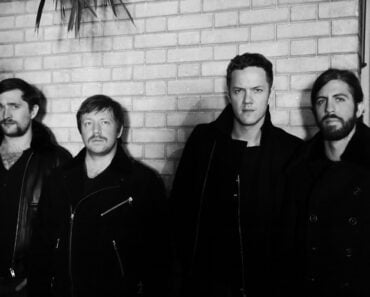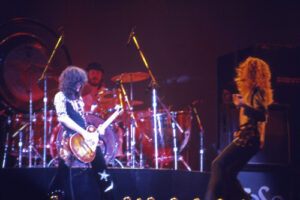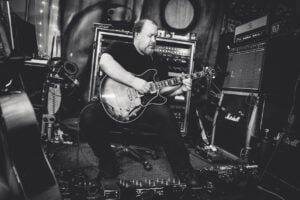# 10 – Talking In Your Sleep – The Romantics
Read More: Top 10 Songs From The Romantics
# 9 – Wake Up Little Susie – The Everly Brothers
Read More: Top 10 Everly Brothers Songs Decade By Decade
# 8 – Sleeping With The Television On – Billy Joel
“Sleeping With The Television On” is a lesser-known gem from Billy Joel’s highly successful Glass Houses album, released on March 12, 1980. While the album is widely remembered for its chart-topping singles like “It’s Still Rock and Roll to Me,” this track stands out as a thoughtful exploration of loneliness and modern relationships, encapsulating a restless, late-night feeling of isolation. Glass Houses was recorded at A&R Recording Studios in New York City, produced by Billy Joel’s longtime collaborator Phil Ramone. The album showcased Joel’s shift toward a more rock-oriented sound, heavily inspired by the new wave and punk movements of the time.
Read More: Our 10 Favorite Covers Of Billy Joel Songs
# 7 – Sleep’s Dark and Silent Gate – Jackson Browne
Read More: Jackson Browne’s Best Song From Each Of His Studio Albums
# 6 – I’ll Sleep When I’m Dead – Warren Zevon
Read More: Complete List Of Warren Zevon Albums And Discography
# 5 – Sandman – America
Read More: America’s Best Song On Each Of Their Studio Albums
# 4 – Sleeping Angel – Stevie Nicks
“Sleeping Angel” by Stevie Nicks, featured on the soundtrack for Fast Times at Ridgemont High, is a captivating song that blends Nicks’ ethereal voice with introspective and emotional lyrics. Released in 1982, this song accompanies a film known for its candid depiction of high school life in the early 1980s. Directed by Amy Heckerling and based on a book by Cameron Crowe, Fast Times at Ridgemont High has become a cultural touchstone, showcasing teenage angst, love, and coming-of-age experiences. Nicks’ contribution to the soundtrack provides a perfect emotional backdrop to the film’s more tender and reflective moments.
Read More: Stevie Nicks’ Best Song On Each Of Her Albums
# 3 – A Pillow Of Winds – Pink Floyd
“A Pillow of Winds” by Pink Floyd, from their 1971 album Meddle, stands as one of the band’s most serene and introspective tracks. This acoustic love song offers a contrast to the more experimental and often darker sounds that Pink Floyd is typically known for, showcasing a softer side to the band. The song is anchored by David Gilmour’s beautifully intricate guitar work, which is played using an open E tuning, creating a delicate, flowing sound that matches the dreamy quality of the lyrics. Gilmour’s slide guitar and Roger Waters’ fretless bass add subtle layers to this pastoral track, enveloping the listener in a tranquil atmosphere.
Read More: Top 25 Pink Floyd Songs
# 2 – Behind the Wall of Sleep – The Smithereens
“Behind the Wall of Sleep” by The Smithereens is a quintessential track from their 1986 debut album Especially for You. This song captures the band’s signature blend of alternative rock, power pop, and catchy melodies. Written by lead singer Pat DiNizio, the lyrics are inspired by a real-life crush he developed on Kim Ernst, the bassist of the Boston-based band The Bristols, after a show. The song’s vivid imagery, like “She had hair like Jeannie Shrimpton, back in 1965” and “She stood just like Bill Wyman,” offers a nostalgic snapshot of 1960s pop culture while blending the personal and the fantastical. DiNizio crafted the lyrics on a cocktail napkin during a hungover flight from Boston to New York, and the song’s melody came to him in the same moment, which he kept humming to himself to ensure he wouldn’t forget it.
Read More: Top 10 Smithereens Songs
# 1 – Tie – I’m Only Sleeping / Golden Slumbers The Beatles
To wrap up our list of the 10 Best Rock Songs About Sleep, we couldn’t settle on just one Beatles song to close it out, so it’s a tie between “I’m Only Sleeping” and “Golden Slumbers.” Each track offers a different perspective on sleep, from the dreamy, laid-back vibe of “I’m Only Sleeping” to the tender, hopeful lullaby of “Golden Slumbers.” Both songs are beloved classics in the Beatles catalog, and their distinctive sounds, themes, and moods make it impossible to choose between them.
“I’m Only Sleeping”
“I’m Only Sleeping” is a track from Revolver, released in 1966, during a period when the Beatles were experimenting heavily with studio techniques and psychedelic sounds. Written primarily by John Lennon, the song captures his desire to escape the pressures of fame and find peace in the sanctuary of sleep. The song was recorded at Abbey Road Studios between April 27 and May 6, 1966, with production by George Martin.
Musically, “I’m Only Sleeping” stands out with its backward guitar solos, a technique that was groundbreaking at the time. George Harrison’s reversed guitar parts give the song a hazy, dream-like quality, matching the lyrics’ themes of drifting between consciousness and sleep. Paul McCartney’s bassline and Ringo Starr’s subtle drumming contribute to the laid-back, almost lethargic groove of the song. Lennon’s lazy, almost slurred vocals underscore the feeling of relaxation and a longing for sleep, with lines like “When I’m in the middle of a dream / Stay in bed, float upstream” perfectly encapsulating the desire to remain in a state of rest. The track reached No. 1 in several countries, solidifying its place as one of the band’s most iconic songs from the Revolver album, which itself is often regarded as one of the greatest albums in rock history.
“Golden Slumbers”
“Golden Slumbers” is another Beatles song focused on sleep, though its tone is vastly different from “I’m Only Sleeping.” Released on the iconic Abbey Road album in 1969, “Golden Slumbers” was written by Paul McCartney and serves as the first part of the medley that closes the album. It’s based on a poem from Thomas Dekker’s Patient Grissel (1603), which McCartney found in his step-sister’s piano book. Since McCartney couldn’t read the music notation, he composed a new melody and turned the poem into a lullaby. The track was recorded at Abbey Road Studios in July and August 1969, with George Martin once again handling production duties.
While the lyrics are minimal, they are deeply emotional: “Golden slumbers fill your eyes / Smiles await you when you rise.” McCartney’s powerful vocal delivery and the orchestration arranged by George Martin create a sweeping, cinematic effect that adds to the song’s grandeur. The track leads directly into “Carry That Weight” in the famous Abbey Road medley, and its place in Beatles history is significant as it was one of their final recordings together. The song evokes a sense of nostalgia, as it hints at both the end of an era for the band and the closing of their musical journey. The orchestral arrangement, alongside McCartney’s expressive piano playing, offers a contrast to the more psychedelic, dreamy sound of “I’m Only Sleeping.”
Read More: Complete List Of Beatles Band Members





































A favorite of mine to crank up the volume, and get lost in the music and lyrics – “Chimes” by the J. Geils Band;
Eerie and menacing organ opening solo from Seth Justman, and Peter Wolf’s sinewy vocals and solitude lyrics, climaxing to a full blown epic.
(Version from “Blow Your Face Out”)